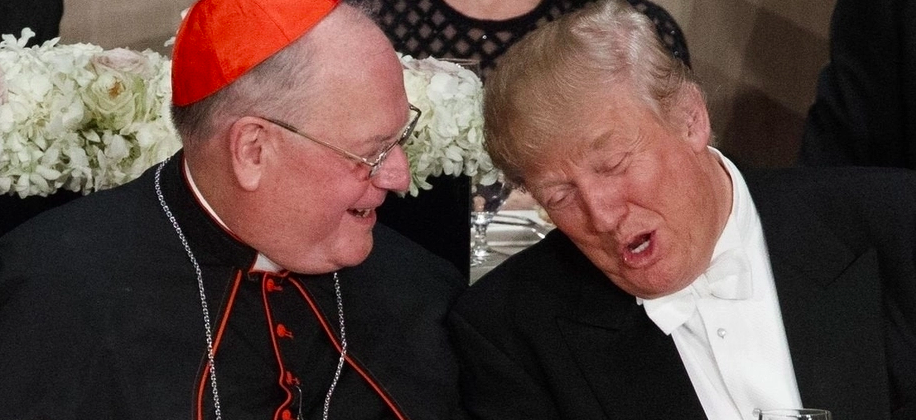
By Ray McGovern
What Dolan chooses to focus on will be quite telling. I am hoping that at least some of what he says reflects some of the cardinal tenets of Catholic social teaching.
As a Cardinal, that is, a “Prince of the Church” I am the first to acknowledge that I lack the ascetic appearance of a prophet. Nor do I claim to be one. I do wish, though, to leave a prophetic message with you this evening, so I will quote freely from other prophets — ancient, and those of our own time. I am inspired, most of all, by Proverbs 31:8-9: “Speak out for those who cannot speak … defend the rights of the poor and needy.” So, here goes.
First, a clear message from Deuteronomy 27:19: “Cursed is anyone who withholds justice from the foreigner, the orphan, or the widow.”
Four years ago, Pope Francis pointed out that “the sin that Jesus condemns most” is hypocrisy. “It is hypocritical to call oneself a Christian and send away a refugee.” Francis condemned what he termed the “contradiction in those who want to defend Christianity in the West and … are against other religions and against refugees.”
Last September, the Pope called attention to Jesus’s parable of the rich man and Lazarus, calling to mind some of the colorful, instructive details. Francis warned:
“In the end, we too risk becoming like that rich man in the Gospel who is unconcerned for the poor man Lazarus, covered with sores, who would gladly have eaten his fill of the scraps that fell from the rich man’s table. Too intent on buying elegant clothes and organizing lavish banquets, the rich man in the parable is blind to Lazarus’s suffering. Overly concerned with preserving our own well-being, we too risk being blind to our brothers and sisters in difficulty.”
With all the current talk about the economy, I wish also to bring to mind a basic tenet of Catholic social teaching: the preferential option for the poor. (Some wags have called Catholic social teaching the best kept secret of the Church. The more reason to remind.)
In 1986, the U.S. Catholic bishops issued a formal statement on the economy, calling on us to make a fundamental “option for the poor.” I shall quote just one sentence: “The more fortunate should renounce some of their rights so as to place their goods more generously at the service of others.”
Yes, Catholic bishops issuing a solemn call for the redistribution of wealth. A radical idea, indeed, in the original sense of radical — rooted in the core of our Abrahamic faith. Another way to say that is that no one is entitled to accumulate still more of what they don’t need, while others are deprived of the necessities of live. This is our common Judeo-Christian-Muslim tradition and challenge. Is our country going in this direction?
I regret that this does not go over well with many of you, but ringing in my ears are the words of a more recent profit, Archbishop Oscar Romero, who fell to an assassin’s bullet 40 years ago:
“A gospel that doesn’t unsettle, a word of God that doesn’t get under anyone’s skin, a word of God that doesn’t touch the real sin of the society … what kind of gospel is that?”
We all know what happened to Romero — and to Dr. Martin Luther King, Jr. But as Dr. King put it:
“A time comes when silence is betrayal.”
This is one of those times.
May God bless all people, including those in the United States of America.
